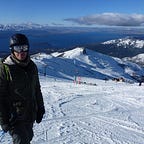Day 3 — Big companies move fast (too)
Why do I use disclaimers: There are two things I seriously did not take into consideration when committing to post often: driving is tiring and writing this blog needs focus. Lesson learned, I will keep doing my best to post often.
On Thursday we visited Google, Intel and Nvidia. We already felt comfortable here, know which exit to take on the highway, made friends with people at home (google Rainbow Mansion) and left the jet lag behind (not for me but for those who suffer from it). Our first stop was Googleplex, a Google’s campus very similar to what’s shown in the movie “The intern”. A software engineering student from ITBA was interning at Google and gave us a tour all over the campus which made things pretty cool; we had the chance to talk with someone who is still a student but also knows how things work here and where to get the best on-campus food. Moving to the important stuff (apart from food) his boss spent an hour with us sharing his path from Africa to the Netherlands, and then to the company. Just to give you an idea, he made the Android updates 30% faster by introducing some changes to the code (the magic came from indexing). Impressive, right?
After leaving a great great visit in Gooogle we drove for 20' and arrived to Intel. I guess you do not expect Intel to be a company related to entrepreneurs (it’s totally fine I also did not before this visit) but it really is. Intel is a big dinosaur that moved fast and adapted to the new needs of technology and now it is really everywhere (+90% of the servers in the world use Intel. That’s fairly enough to say everywhere) shifting the focus of their bussiness from PCs to data. The meeting was specifically with an Argentine who works for Intel Capital, a division that focuses on investing in startups mainly in the Bay Area and make them grow sustainably not only by giving them money and mentorship but also by leveraging the network and sales force they already have to take those small companies to the next level. They ratio of success is pretty higher than the average of the industry which made us ask them how they choose the projects and the team. Look for the tips on the bullet points at the end of the article.
It seemed to us that the day could not get any better; two awesome meetings made the day a great one so far. But the last year Tech Trek team told us that Gerardo (a Spanish lawyer working at Nvidia) was definitely someone we should meet and fortunately he had some room in the agenda for us. It was both fun and mind blowing. His personal story is inspiring (basically a lawyer who always loved computers, videogames and knows how to connect with people, be a negotiator in big deals and travel worldwide at the same time) but what impressed us the most was the culture of the company; the founder is an engineer who really supports engineers (they “drive” the firm) but there is a great vision on how tech tools like simulation help architects, user experience researchers and designers to try out things before they happen in the real world (shout out to those who introduced me to Anylogic), opening the possibility of creating machines from scratch with the detailed specifications that they got from simulations in advance. Doesn’t that sound like science fiction? That’s how they built their major building and it is an out-of-this-world one. The second one is on its way.
You can see, Thursday was a pretty hectic day. A little bit about who we are living together (Did we master the art?); We have to make decisions all the time as a team and that is forcing us to get to know each other better and see how we react under pressure. It’s going well but I must still say it is a big discovery for us all. Many thanks to my car that remains calm when we are short of time and I take the wrong exit on the highway. The main lessons of the day:
- It happens a lot in the Bay Area that companies are both clients and competitors. For example, you provide them servers but also you two are in the market of online music. A lot of NDAs make collaboration possible.
- Each small team in the big corps has its own culture when it comes to an entrepreneurial approach and that is what makes them move fast.
- Rely on people and keep an eye on metrics. You need both.
- What does developing a startup mean? Developing the bussiness, doing public relations, showing up in events and being well known in the ecosystem.
- Take your past failures as experience and move forward. But make sure your learned from them.
- It is not the first time we heard this: a top tier MBA gives you access to an unvaluable network that helps you to develop almost whatever you wanna do (create your own business, work in the government, run an NGO).
- There are already three people that told us that setting boundaries for your personal life is a thing they strictly do. The most common example is about “having dinner at home”.
- Do you really wanna be part of a startup? Or you prefer a big tech company? Or none of those? There is no right/wrong answer but ask yourself.
- Silicon Valley is definitely a bubble. Some of the brightest minds of the world are here but the world is not like SV.
- It has been proven that the best way of learning is by having someone teaching you.
